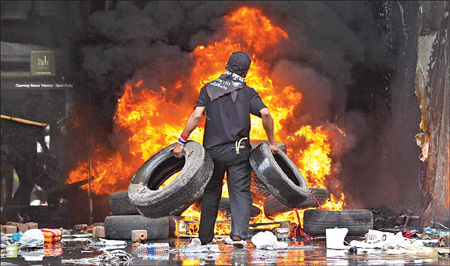Mobile
Bangkok in flames after protest leaders surrender
2010-May-20 07:43:04
|

An anti-government protester piles tires on a fire at a shopping center on Wednesday in Bangkok. The downtown area became a battleground as the army stormed a barricaded protest camp and the "red shirt" leadership surrendered, enraging demonstrators who fired grenades and set fires that cloaked the skyline in a black haze.
|
BANGKOK - Rioting and fires swept Bangkok on Wednesday after troops stormed a protest encampment, forcing protest leaders to surrender but sparking clashes that killed at least 12 people and triggered unrest in northern Thailand.
Protesters torched at least 17 buildings, including the Thai stock exchange and Central World, Southeast Asia's second-biggest department store complex. The store was gutted by fire and looked like it may collapse.
Firefighters retreated after protesters shot at them, and thick smoke drifted across the sky of this city of 15 million people.
Sporadic clashes between troops and protesters continued in the night.
The unrest is now the "most widespread and most uncontrollable" political violence Thailand has ever seen, said Charnvit Kasetsiri, a prominent political historian.
"The situation is worse than expected now and it's very difficult to stop," said Kavee Chukitsakem, head of research, Kasikorn Securities. "After the red shirt leaders surrendered, things were out of control. It's like insects flying around from one place to another, causing irritation."
Thai Prime Minister Abhisit Vejjajiva imposed a curfew in Bangkok on Wednesday from 8 pm until 6 am on Thursday.
"Tonight is going to be another worrisome night," government spokesman Panitan Wattanayagorn said.
The government also imposed a partial media blackout on local TV stations, saying all of them will have to air government-prepared bulletins.
Travelers heading overseas or returning to Thailand during the curfew will need to show their passports to security forces to get through checkpoints.
"It's going to be hard to quell this, and tonight is going to be very ominous with the media taken off air and the curfew in place. There will be chaos and a widespread crackdown can be expected," said Charnvit.
Authorities have ordered medical and disaster teams to be on standby as troops continue operations overnight.
The stock exchange, which closed early on Wednesday, will close on Thursday and Friday, along with the city's banks, as a result of the continued violence.
Troops in armored vehicles and firing semi-automatic weapons advanced on the protesters' camp on Wednesday morning in a bloody operation which led to several top protest leaders surrendering.
But that didn't stop the unrest, which has descended into urban warfare, killing nearly 50 people and wounding 340 in the past six days. More than 70 have been killed and more than 1,700 people wounded since the demonstrations began in mid-March.
Minutes after the protest leaders surrendered, three grenades exploded outside the main protest site, badly wounding two soldiers and a foreign journalist, a Reuters witness said.
Several media organizations including the Bangkok Post and The Nation newspapers evacuated their offices after a threat from protesters accusing them of biased reporting.
A staff member of The Nation said they had to rush through a very slim edition, mostly filled with pictures.
Power was lost in typically bustling Sukhumvit Road district, an area packed with tourists and high-end residential complexes, just hours after the army said the situation was under control.
Many tourists remained holed up in their hotels unable to safely leave the buildings as sporadic violence erupted.
About 100 employees of the TV station Channel 3 were trapped on the roof of the highrise when it came under attack, but most were rescued by helicopters, local media said.
Violence also spread to northeast Thailand, a red shirt stronghold, where protesters stormed a town hall complex in the city of Udon Thani, setting a building ablaze, and torched a second town hall in Khon Kaen.
Unrest was reported in three other provinces. The military offensive came a day after the collapse of a proposal for talks aimed at ending five days of chaotic street fighting.
Luo Yongkun, a researcher with the China Institutes of Contemporary International Relations, said the showdown was "no surprise as the troops were fully prepared while the red shirts were poorly equipped".
"But the conflict between the rural poor and the city elites is still unresolved, " Luo said. "Political unrest is far from ending in Thailand."
Xu Liping, an expert on Southeast Asia at the Chinese Academy of Social Sciences, said suppression of the "red shirts" could only raise resentment, and tensions will rise when protesters stand trial.
He suggested the Thai government adopt policies to narrow the wealth gap between rural people and urbanites.
Boonyakiat Karavekphan, political scientist with Ramkhamhaeng University, said "the government will face a tougher task in winning the hearts of the rural people".
Joseph Tan, Asian chief economist with Credit Suisse, said "(The dispersal) is clearly a short-term positive, but we need to see what happens, to see what is going to happen over the next one or two weeks." (China Daily 05/20/2010 page1)
[Jump to ]
Nation | Biz | Comment | World | Celebrity | Odds | Sports | Travel | Health
m.chinadaily.com.cn
To subscribe to China Daily, call 010-64918763 or email to circu@chinadaily.com.cn
